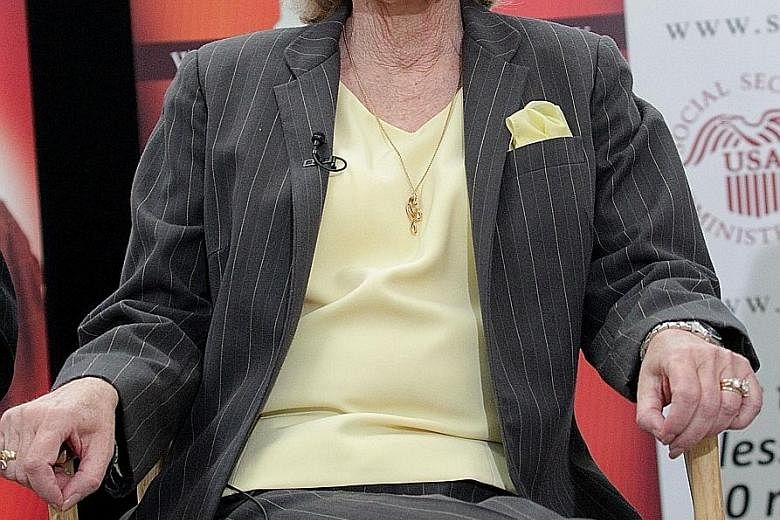NEW YORK • Patty Duke, an Oscar winner renowned at mid-century as a child star of stage, film and television, who had public struggles with bipolar disorder and was respected in adulthood as a mental- health advocate, died on Tuesday at a hospital near her home in Coeur d'Alene, Idaho. She was 69.
The cause was complications of a ruptured intestine that she suffered on Thursday, said her husband Michael Pearce.
Her son Sean Astin, the actor who played hobbit Samwise Gamgee in The Lord Of The Rings trilogy, said: "This morning, our beloved wife, mother, grandmother, matriarch and the exquisite artist, humani- tarian and champion for mental health Anna Patty Duke Pearce closed her eyes, quieted her pain and ascended to a beautiful place."
Duke came to wide public notice in 1959, at age 12, when she starred as Helen Keller in the original Broadway production of William Gibson's drama The Miracle Worker. The actress Anne Bancroft, who died in 2005, played Helen's teacher, Annie Sullivan.
For her performance in the 1962 Hollywood film adaptation, in which she and Bancroft reprised their roles, Duke won the Academy Award for Best Supporting Actress.
She came to even wider attention the next year, with the debut of The Patty Duke Show, the popular sitcom in which she played the dual roles of Patty Lane, an unaffected Brooklyn girl, and her worldly, Scottish "identical cousin", Cathy Lane.
But in an irony not lost on Duke, the fame she won for playing a typical teenager belied the lifelong upheavals that began in childhood.
Among them were a threadbare upbringing; parental alcoholism; her removal from her home by her managers, who co-opted not only her earnings, but also, she later wrote, her very identity; her implication in the television quiz-show scandals of the late 1950s; sexual abuse; four marriages; and more than one suicide attempt.
In the end, however, she found contentment in an enduring fourth marriage; the presidency of the Screen Actors Guild; the proper diagnosis and treatment of her bipolar disorder; her public lobbying for causes including mental health, Aids awareness and nuclear disarmament; and a renewed television career that brought her three Emmys.
The youngest of three children, Anna Marie Duke was born in New York City on Dec 14, 1946, and brought up in Queens. Her father was a handyman and taxi driver, and her mother was a cashier.
When she was six, her father left the family and she saw him again only occasionally. She began acting at about eight, when she was taken on by John and Ethel Ross, husband- and-wife managers who represented her older brother, Raymond.
The Rosses changed her name to the pert, less ethnic-sounding Patty. "Anna Marie is dead; you're Patty now," she was told, as she recalled in a memoir, Call Me Anna (1987, with Kenneth Turan).
As Patty Duke, she landed bit parts in films and on television before being cast in The Miracle Worker. To prepare her to audition for the part, the Rosses took to blindfolding her and moving the furniture around.
They later removed her against her wishes from her mother's home and took her to live with them, she said.
They also, she said, fed her uppers and downers, introduced her to alcohol and sexually molested her on occasion.
By the time she broke with the Rosses as a young woman, she later said, she discovered that they had embezzled the vast portion of her career earnings - about US$1 million.
To extricate herself from their Svengali-like clutches, she married Harry Falk, an assistant director on The Patty Duke Show, when she was still a teenager; the marriage ended in divorce.
A second marriage, to a stranger, Michael Tell, was annulled after 13 days, before a son was born in 1971.
In 1972, Duke married actor John Astin and raised the child, Sean, as her husband's son. She had a son with Astin, actor Mackenzie Astin. They divorced in 1985.
She married her fourth husband, army drill sergeant Pearce, in 1986 and preferred afterwards to be known in private life as Anna Pearce. They had a son, Kevin.
Her other roles include the female lead in My Sweet Charlie, a 1970 television movie in which she portrayed a pregnant runaway who falls in love with a black man, played by the late actor Al Freeman Jr. Her performance garnered her the first of her three Emmy Awards.
On the big screen, she appeared in Valley Of The Dolls, the 1967 adaptation of Jacqueline Susann's novel, playing Neely O'Hara, a woman addicted to sex, drugs and alcohol.
But all the while, Duke was dealing increasingly with a real-life emotional lability for which she had no name. She attempted suicide several times and was committed to mental hospitals.
Only in 1982 did she receive a diagnosis of bipolar disorder, along with proper medication.
In a quotation on her website, officialpattyduke.com, she summed up her quicksilver life.
"I've survived," she wrote. "I've beaten my own bad system and on some days, on most days, that feels like a miracle."
NEW YORK TIMES, AGENCE FRANCE-PRESSE


